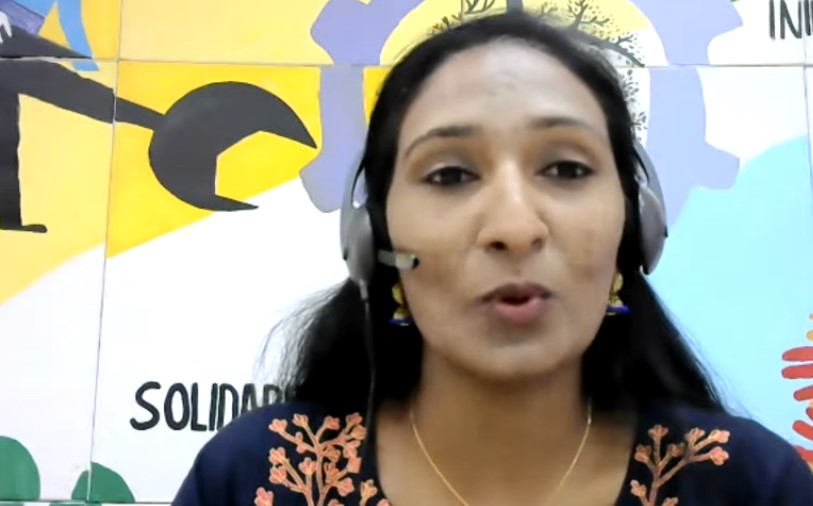
Divya Sojan fought TB thrice in eleven years of her nursing work: lot more needs to be done to end TB worldwide
(Image by CNS) Details DMCA
"Difficulties in your life do not come to destroy you but to help you release the hidden potential and power". This quote by the late Dr APJ Abdul Kalam, a scientist and the 11th President of India, is the dictum for nurse Divya Sojan, who during the 11 years of her nursing career, has battled with tuberculosis (TB) thrice.
Here
is her story as narrated by her via an interview given to CNS (Citizen News
Service), during the 51st Union World Conference on Lung Health held virtually
last month.
She recalls
that, "During a tiring night shift in 2011, I felt a shooting pain in my
chest. An X-ray showed pleural effusion and a patch over the left upper zone of
my lungs. I was started on a 4 drug treatment regimen for drug-sensitive TB.
Even though I initially suffered from nausea and joint pains, I did not have
any severe side effects and recovered completely after 6 months. I did not even
feel like I was having TB. I was staying in a hostel and my friends took care
of everything for me".
A year later, she got infected with H1N1 virus while taking care of a swine flu
patient in the same hospital.
"I was wearing a mask and had just been there for a few minutes to help
and the patient's ventilator tubing got disconnected. The very next day I
developed flu symptoms and tested positive for swine flu. Five of us were there
with the patient but only I got infected, perhaps because of my low
immunity."
In 2014, Divya left her Mumbai job to do her Masters in Neuroscience at India's
top medical institution (All India Institute of Medical Sciences (AIIMS) Delhi).
It was while studying in Delhi that one day she suddenly felt a pain in her
chest - the kind of pain she had had earlier. An X-ray revealed a patch over
the left upper zone of her lungs. After a CT scan she was started on treatment
for drug-sensitive TB, for a second time. This time she had to take
streptomycin injections also. Due to mild pleural effusion and breathing
difficulty she was hospitalised in AIIMS for one month.
Divya recalls that, "With the injections and the tablets, I felt a lot of
weakness and had no energy to stay up late night and finish my assignments. But
I coped somehow with the unstinted support of my teachers and my friends who
became my caretakers. My friends strived their best for me to not miss my
family. My seniors took good care of my physical and mental well-being. Even
though I was struggling, I went back to my studies after getting discharged
from the hospital and finished my treatment in 8 months."
In 2016, after finishing her post-graduation, Divya got a job as a nursing
officer in AIIMS, which was indeed a matter of pride for her. Happy days were
there again. The future looked bright and rewarding.
Last year (in 2019) because of Delhi's infamous air pollution (and also because
of her own ambitions) Divya thought of moving out and try for better job
opportunities abroad. In the process, she got a routine chest X-ray done. To
her surprise the X-ray showed consolidation over the upper and middle zone of
her left lung. Bronchoscopy and molecular diagnostic (CB-NAAT) test revealed
that she had rifampicin-resistant TB. And thus began her treatment for
multi-drug resistant TB (MDR-TB).
"I was totally devastated and dreaded the long treatment regimen that was
to follow. From day one of the treatment life became miserable in every sense.
I was taking 22 tablets plus kanamycin injection daily. I suffered from severe
nausea, vomiting and frequent syncope (fainting or passing out). I could not
retain any food, not even water. Within one month I had lost 8kgs of
weight-from 56kg to 48kg."
It became impossible for Divya to continue with her hospital duties while
adhering to the toxic and debilitating treatment. So she decided to take leave,
go to her parents' home in Kerala and take treatment there (from the Directly
Observed Treatment Shortcourse or DOTS centre). While she got all the love and
care from her family, there seemed to be no end to her medical woes. In the 3rd
month of her treatment she suffered from blurring of vision - another side
effect of the medicines.
"I had sleepless nights, crying spells and emotional breakdowns. Neither
me nor my family could figure out what was happening to me. There was a lot of
mental and physical trauma. Life was hopeless and miserable. Many times I
thought that death was better than this suffering."
On top of this, she received a memo from her hospital in Delhi that her sick
leave had not been sanctioned for any further period. Although Divya had
planned to stay in Kerala for the whole duration of her treatment, she had to
return to Delhi after 5 months to join her duties.
Divya is all praises for the TB care and control programme in her home state of
Kerala. "The way the doctors, nurses and coordinators at the DOTS centre
spoke and behaved with me really touched my life. What makes a huge difference
is that the Kerala TB cell works with their hearts and not just with their
brains."
(Note: You can view every article as one long page if you sign up as an Advocate Member, or higher).





